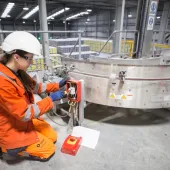FM Conway launch new driver apprentice scheme

Apprenticeship programme aims to address shortfall of qualified LGV drivers in the UK
INFRASTRUCTURE services firm FM Conway have launched one of the construction industry’s first large goods vehicle (LGV) driver apprenticeship programmes.
Forming part of the business’ wider efforts to tackle the industry’s major skills gap, the apprenticeship is aimed at addressing the shortfall of LGV drivers in the UK, which is currently estimated at 45,000 by the Road Haulage Association.
The 13-month apprentice scheme – which FM Conway are funding through the government apprenticeship levy – will aim to support new entrants into the industry, as well as provide existing employees the opportunity to upskill or retrain.
Delivered by FM Conway, in partnership with Scania and South Essex College, the programme will see around 36 apprentices per year learn the functional skills required to drive an LGV, alongside a comprehensive overview of health and safety protocols, sustainable and economical driving and vehicle specifications.
FM Conway’s commitment to delivering the new LGV apprenticeship also reflects their wider self-delivery model. Where possible, the business uses its own vehicles, equipment, materials and in-house teams to deliver construction projects to drive efficiencies and ensure high-quality logistics for customers. The company’s liveried fleet stands at more than 900 vehicles, making it one of the largest private logistic operators in London and the South East.
Liz Garvey, HR director for FM Conway, commented: ‘The skills shortage remains a well-documented, serious challenge for construction. It affects all levels of our business, both on and off site. We need to be flexible in how we tackle the issue, providing a variety of opportunities for people of all backgrounds and ages and using funding mechanisms astutely to plug the gaps.
‘The shortage of LGV drivers has the potential to seriously hamper the wider industry’s ability to get materials and equipment to site. With just 2% of drivers under the age of 25, it’s clear that the sector’s current recruitment process isn’t working. With this new apprenticeship standard, we want to attract people who might never have considered a career in construction before or been aware of the diversity of roles it can offer.’
She continued: ‘However, we also need to ensure that we’re retaining our existing employees and providing long-term careers for them. The beauty of this standard is that it is both a gateway for new talent and a way to help more experienced employees retrain and transition into positions that might better accommodate their needs.’









